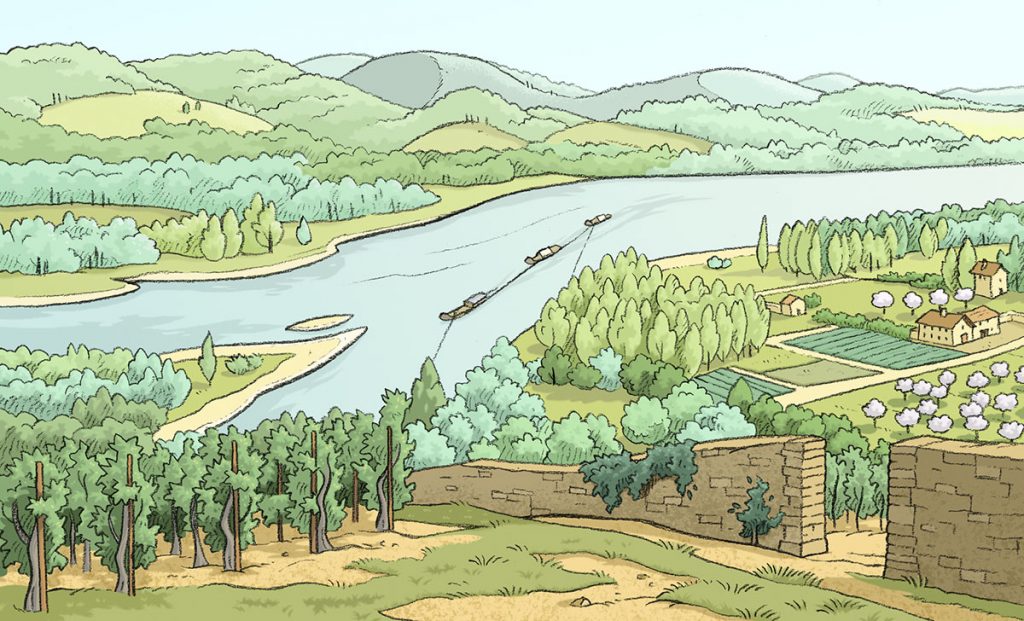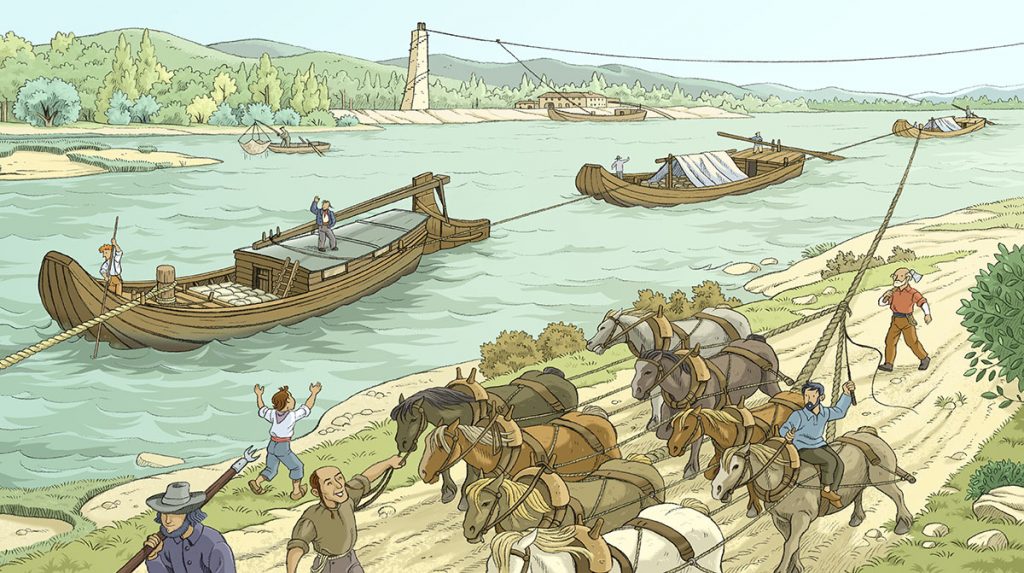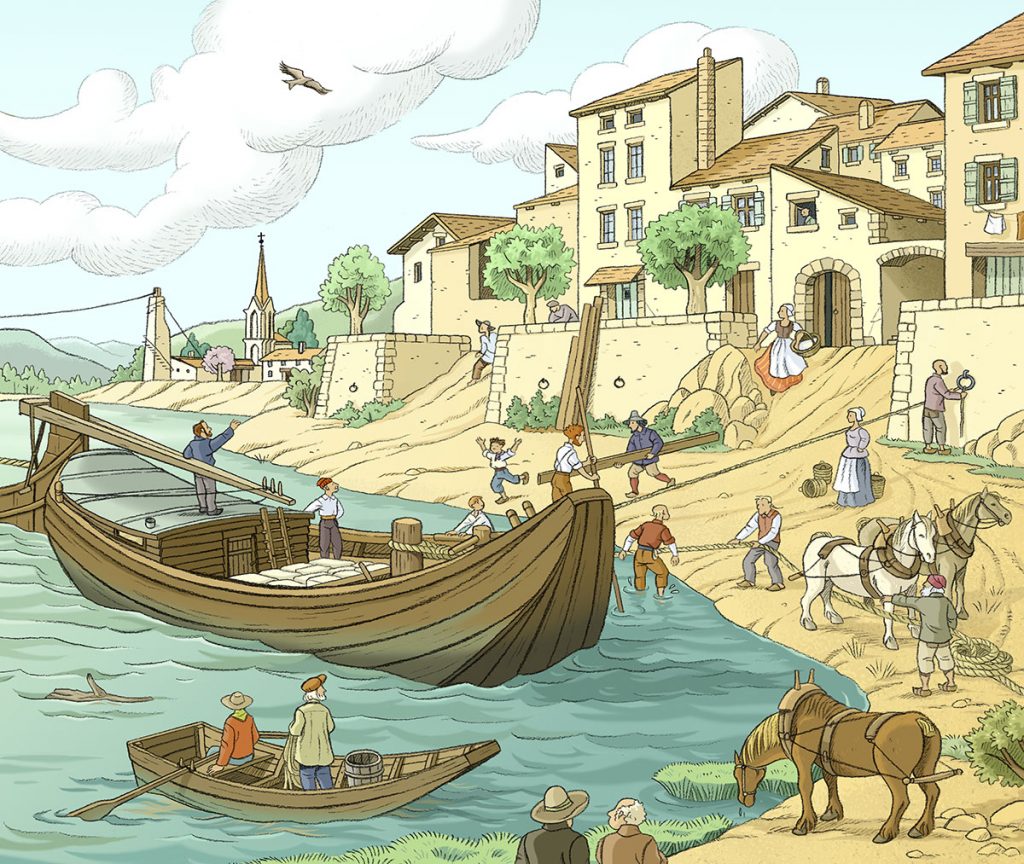The poet Frédéric Mistral, born in 1830 in Provence, Nobel Prize for Literature in 1904, was the greatest storyteller of the Rhone and the mariners of Condrieu. We owe him the magnificent Poème du Rhône.
Translation from the Modern Provencal by Maro Beath Jones, 1937.
| Lou Pouèmo dou Rose Van parti de Lioun à la primo aubo Li veiturin que règnon sus lou Rose. Es uno raço d’ome caloussudo, Galoio e bravo, li condriéulen. Sèmpre Planta sus li radèu e li sapino, L’uscle dou jour e lou rebat de l’aigro Lé dauron lou carage coume un brounze. Mai d’aquéu tèms encaro mai, vous dise, Lé vesias d’oumenas à barbo espresso, Grand, courpourènt, clapu tau que de chaine, Boulegant un saumié coume uno busco, De pupo à pro cridant, jurant de-longo E largamen, pèr se baia courage, Au poutarras pintant la roujo tencho, A beu taioun tirant la car de l’oulo. De-long dou flume èro uno bramadisso Que d’auro en auro entendias de-countuni : « Pro vers la baisso, hou ! Reiaume ! Empèri ! Amount la pro ! Dau ! Fa tira la maio ! » Ero Coundriéu soun nis, ounte s’amodon De noste vènt-terrau li proumié boufe. | Le Poème du Rhône From Lyons at the blush of early dawn The bargemen, masters of the Rhone, depart, A robust band and brave, the Condrillots, Upright upon their crafts of planks of fir, The tan of the sun and glint from glassy wave Their visages have bronzed as with gold. And in that day colossuses they where, Big, corpulent, and strong as living oaks, And moving beams about as we would straws. From stern to stem unceasingly they shout. And now to gather courage for their task, Approach from time ti time the steaming crock To quaff from it deep draughts of red piot, And snatch from other pots some shreds of meat. A clamor thus alway adown the Rhone Was heard from North to South without a truce : « Ease off the prow again ! Royaume ! Empire ! The prow upstream ! Ho, lads ! Pull on the maille ! » From Condrieu they were, where fist the gusts Of chill mistral, South’s mighty wind, are felt. |

| Coundriéu en aquéu tèms èro la maire Di grand patroun de Rose.[…] O tèms di viei, d’antico bounoumio, que lis oustau avien ges de sarraio E que li gènt, à Coundriéu coume au nostre, Se gatihavon, au calèu, pèr rire ! […] O tèms di vièi, tèms fai, tèms de simplesso, Qu’èro lou Rose un revoulun de vido Ounte venian, enfant, sus l’aigo longo Vèire passa, fièr, l man à l’empento, Li Coundriéulen ! Lou Rose, gràci-à-n-éli, Ero un grand bruse plen de vounvoun e d’obro. | From Condrieu, renowned o’er all the Rhone, Came then the sturdy pilots of the stream. […] Oh days of old, of old-time honesty, When mansions knew no need of lock nor key, And when good people, yea, in Condrieu, Would meet, as here, by night in friendly chat ! […] Oh days of old, of gay simplicity, When throbbed with life the noble river Rhone : When we as children from its grassy slopes, Entranced, would watch the Condrillots sail by, Who proud at helm stood guiding on their barks. Thanks be to them, the Rhone a hive was like, Enormous, busy, filled with stir and noise. |

| Ah ! Pèr sant Micoulau, quand s’encantavo Lou Reinage, au pourtegue de la glèiso, Cresès que n’ère un flame de triounfle Pèr aquéu qu’èro Rèi de la Marino ? E cresès que n’i’ aguèsse un de rebobi Pèr abéura la glori dou Reinage ? Li brout de biou emé sa graisso mouflo E li dindard e lis auco poupudo, Li cambajoun estuba, li caieto d’erbo chaplado e cuecho au four, bèn, imo, Li boni pougno enredounido en tourto, Pastado au burre emé d’iou, li rigoto Poulidamen plegado emé de pampo, Et lou vin blanc de païs que petejo, Avien de tout, en aquéu jour, soun rule ! | And on the day of good Saint Nicholas, When royalty is boldly auctioned off (And that upon the church’s portico), Can ye not think how proud the day of him Whose honor ’tis to be the chosen king To reign the year o’er all the river’s fleet ? And think ye not there be some junketing His kingship’s glory meet to celebrate ? The breasts of beef all round and plump and fat, The turkey-cocks, and geese, and huge ham smoked, And such caillettes of herbs fine cut and rich, In ovens baked and oily dripping hot, Delicious cake (or pognes) in butter cooked, And cheeses made from goat’s milk, called rigottes, And vine leaves wrapped to add unto the taste ; And finally the country’s sparkling wine Is passed and quaffed unstinted all the day. |

